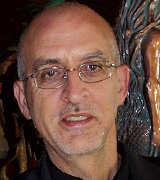Greek education in America

Dimitri C. Michalakis
My father Constantine was a mainstay of Greek education in America by serving as a principal of parochial schools in Montreal, Chicago and New York spanning nearly four decades of service. Recently I visited Chicago and roamed through the halls of Plato School of the Assumption Church (my father was principal in the school’s heyday through the ‘60s and early ‘70s), which in their day were the crown jewel of the Greek Archdiocese system. The school itself was a beautiful building and a triumph for the immigrants who had come to Chicago and worked every job from shoeshine peddlers to peanut vendors to dishwashers and saved their hard-earned dollars to build a church in the Byzantine style and a school made up of stone that they imagined would last through the ages as a testament to their hard work and their achievement.
Unfortunately, as in many urban Greek American communities throughout the United States, the neighborhood changed, the parishioners fled to the suburbs, and the beautiful church and school building I remember so well were left behind, stranded in a community that is only a ghost of the vibrant Greek American community that I remember so well. The church is just as beautiful and hasn’t changed a bit. In the few hours that I spent there, I saw people constantly going in and out (mostly seniors, I admit) and the annual festival being advertised.
But the school, after many vicissitudes over the more than forty years since I attended there (attendance steadily declined from a high of 500 children in the ‘60s) was undergoing a refurbishing to get it ready to open this month as a charter school (which we will profile in our next issue). “It has nothing to do with the church anymore,” one elderly church board member told me as we stood in the shade between the church and the school (a favorite play spot during recess when I was a kid). “It was leased to this group for ten years and they are an independent outfit.”
Perhaps it’s for the best: school attendance at Plato, as I mentioned, was steadily declining and the inevitable would have been that the school would have closed altogether and the building used most likely as an adjunct of the nearby Loretto Hospital (which has since taken over most of the old playground as a parking lot). It will now continue as a school, it will have a Greek curriculum, and the stubborn will of those of us who remember the glory days of Plato School will continue to think of it, and if we live in Chicago (as I don’t), will continue to send our kids there, perhaps to the school, perhaps only to the Sunday school and youth events.
The future of Greek American education is going a change and the glory days when Greek parochial schools were for Greeks only and the schools were a focal point of the inevitable Greektown that surrounded them may be a thing of the past. The traditional old communities in big cities like Chicago and New York have been left stranded, but not entirely abandoned, and perhaps it’s inevitable that a new model would be found to make Greek education still a vital and continuing part of our life and the lives of our children in America.












0 comments